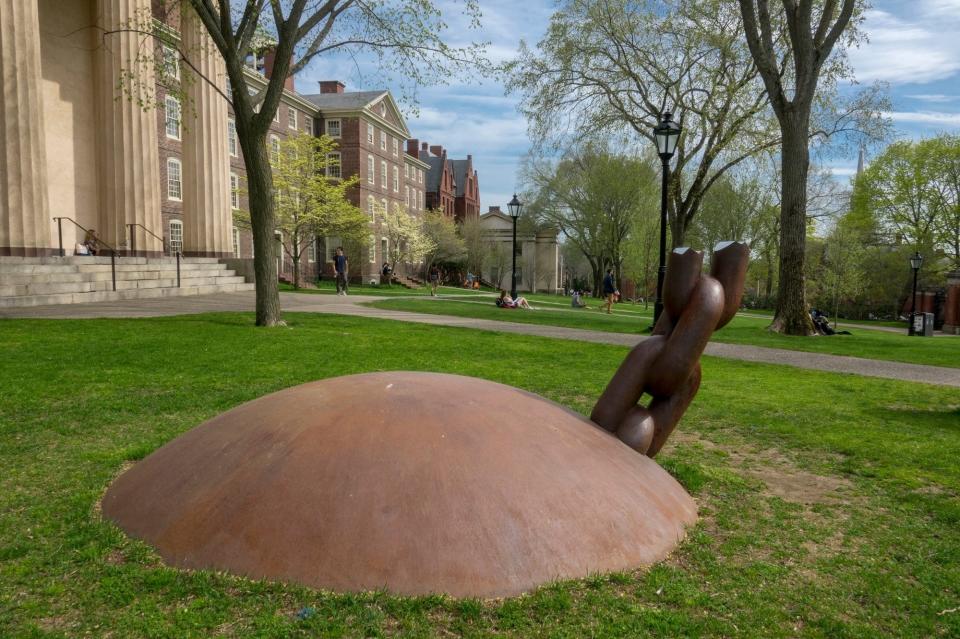Opinion: Misplaced indignation over 1619 Project and teaching of US racial history
H. Philip West Jr. was executive director of Common Cause Rhode Island before his retirement. He is the author of "Secrets & Scandals: Reforming Rhode Island, 1986-2006."
Howls of indignation ring out against the "The 1619 Project," "Caste," "The Warmth of Other Suns," and virtually any books that explore the shameful history of racial oppression in America. A recent Journal column ("RI's education elitists display contempt for American ideals," Commentary, March 4) dismissed efforts to teach America’s bloody racial history as “woke, divisive, and unprofessional.” Bans against uncomfortable content have been enacted in seven states, and efforts are underway in 16 more, including Rhode Island, where one bill would explicitly ban 1619 Project materials. Rather than study the facts, white polemicists fan flames of racial resentment for political gain.
But, as John Adams declared before a Boston jury in 1770, “Facts are stubborn things; and whatever may be our wishes, our inclinations, or the dictates of our passions, they cannot alter the state of facts and evidence.”
More: RWU class looks at how race shapes the law. Could it change how law is taught nationwide?
Two Black women won Pulitzer Prizes for helping Americans grasp facts that have been routinely and systematically erased from our history.
For her book "The Warmth of Other Suns," Pulitzer Prize-winner Isabel Wilkerson interviewed more than a thousand people who fled the Jim Crow caste system in Southern states. Wilkerson writes that “nearly every Black family in the American South … had a decision to make.” They were sharecroppers evicted from farmlands, “typists wanting to work in an office, yard boys scared that a single gesture near the planter’s wife could leave them hanging from an oak tree.” The National Lynching Memorial researched more than 4,075 lynchings between 1877 and 1950, mostly in 12 Southern states. In response to white terrorism, Black families fled north. More than six million became refugees within our borders.

In "Caste: The Origins of Our Discontents," Wilkerson explores common functions of caste systems in India, the United States, and Nazi Germany. She writes: “A caste system endures because it is often justified as divine will ... and passed down through generations.” She notes correctly: “Like the cast on a broken arm, like the cast in a play, a caste system holds everyone in a fixed place.”
In 1913 a prominent Southern educator, Thomas Pearce Bailey, published what he called “the racial creed” of the South, including this central tenet that explains the ferocious white backlash against President Barack Obama: “Let the lowest white man count for more than the highest Negro.”
More: PVD's reparations: National model or 'trivialized' budget line that won't create change?
More: Prejudice a cruel fact in R.I. history
Nikole Hannah-Jones had already received prestigious journalism awards when she assembled scholars of history, law, religion, sociology, and related fields to examine facts that had vanished from American history as if they never happened. Participants pondered an origin story beginning with the sale of captive Africans to Jamestown settlers in 1619 rather with the Mayflower’s landing at Plymouth in 1620.
Hannah-Jones remembers high school courses where she learned nothing about America’s cornerstone date, which she says was “The year white Virginians first purchased enslaved Africans, the start of American slavery, an institution so influential and corrosive that it both helped create the nation and nearly led to its demise...” Her 1619 Project authors catalogued ways that an economy built on the hereditary enslavement of human beings corrupted law, commerce, medicine, religion, and politics.
Isabel Wilkerson compares uncovering America’s hidden history to a family’s discovery that alcoholism, depression or the BRCA markers for cancer run in their genes. She writes how important it is to learn about our family disease. Once we know the facts, we may be able to change the outcomes. Instead of falling into rage and despair, we may begin to hope for recovery.
This article originally appeared on The Providence Journal: The importance of learning about our past misdeeds | Opinion Column

